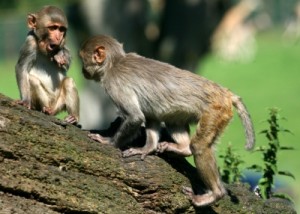The vast differences among humans is what makes us unique. Unfortunately these differences have been the cause of many wars and discrimination all over the world.
Science Daily covered a new study, in the March issue of the Journal of Personality and Social Psychology, that shows prejudice may have an evolutionary basis.
For those who don’t know, prejudice is having a preconceived judgement toward a person or people because they are different.
The study conducted at Yale University has found that social groups of Rhesus Macaque (Macaca mulatta) show prejudice to other social groups. The researches showed the subject monkeys pictures of in-group monkey faces, and out-group monkey faces. And, they also would pair those faces with either good things like a banana, or bad things like a predator. The researches then recorded the amount of time the subject monkeys would look at each sequence. So, there was little difference in the looking time when in-group monkeys were paired with good things, and out-group monkeys were paired with bad things.
What surprised the researches was that when a picture of a out-group monkey was paired with a good thing, the monkey would look at it longer. This is because like humans, monkeys view in-group monkeys as positive and out-group monkeys as negative.
These results imply that the ability to distinguish between “us” and “them” may be at least 25 million years old, when humans and Rhesus monkeys shared a common ancestor.
Fortunately, in the relatively recent years of human existence, humans have become more aware of negative prejudice, and have been starting to change their views. Some humans even have a laugh about it.


